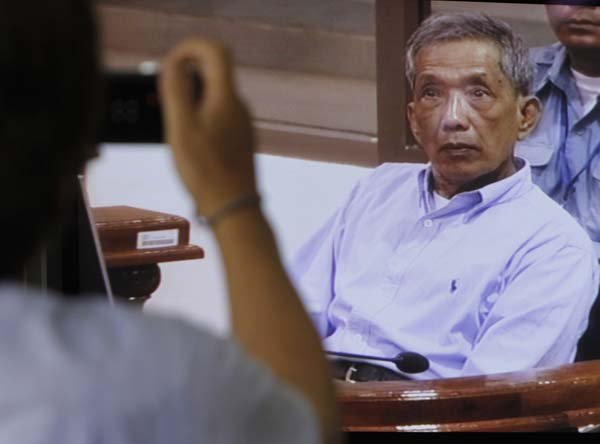PHNOM PENH, Cambodia — A U.N.-backed tribunal sentenced the Khmer Rouge’s chief jailer to 35 years for overseeing the deaths of up to 16,000 people - the first verdict involving a senior member of the “killing fields” regime that devastated a generation of Cambodians.
Victims and their relatives burst into tears after learning that Kaing Guek Eav - also known as Duch - will serve only 19 years after being convicted of war crimes and crimes against humanity after taking into account time already served and other factors.
That means the 67-year-old could one day walk free, a prospect that infuriated many who have been demanding justice for victims of the regime that killed an estimated 1.7 million people between 1975-79.
“I can’t accept this,” said Saodi Ouch, 46, shaking so hard she could hardly talk. “My family died ... my older sister, my older brother. I’m the only one left.”
More than three decades after the ultra-communist Khmer Rouge killed a quarter of Cambodia’s population while trying to turn the country into a vast agrarian collective, Duch is so far the only person to face justice. The group’s top leader, Pol Pot, died in 1998, and four other senior Khmer Rouge leaders are awaiting trial for their part in the deaths from execution, starvation, medical neglect and slave-like working conditions.
The U.N.-backed tribunal - 10 years and $100 million in the making - said it took into consideration the historical context of the atrocities: The regime was the product of the troubled Cold War times.
It also recognized that Duch, who headed Tuol Sleng, a secret detention center for the worst “enemies” of the state, was not a member of the Khmer Rouge’s inner clique and that he cooperated with the court, admitted responsibility and showed “limited” expressions of remorse.
During the 77-day proceedings, Duch admitted to overseeing the deaths of up to 16,000 people who passed through the prison’s gates. Methods used to extract confessions from prisoners included pulling out their toenails, administering electric shocks and waterboarding.
One of the tribunal’s international judges, Silvia Cartwright, said she understood that those who lived through the Khmer Rouge’s reign of terror may be upset at the sentence.
“That’s one of the reasons that we have an objective tribunal ... fixing as balanced a sentence as we can,” she said. “If left to the victims to decide how to punish a person, then it would be, possibly, mob rule.”
The U.S. praised the verdict, calling it historic. “We applaud the commitment of the national and international judges for their comprehensive and independent work to uphold international standards of justice and due process in this case,” State Department spokesman P.J. Crowley said.
The prosecution and defense have one month to appeal.
Unlike the other defendants, Duch has several times asked for forgiveness, even offering at one point to face a public stoning. But his request on the final day of the trial to be acquitted and freed left many wondering whether his contrition was sincere.
“He tricked everybody,” said Chum Mey, 79, one of just a few people sent to Tuol Sleng prison - code-named S-21 - who survived. The key witness wiped his eyes. “See ... my tears drop down again. I feel like I was victim during the Khmer Rouge, and now I’m a victim once again.”
Judges noted that the jailer was often present during interrogations at Tuol Sleng and signed off on all the tortures and executions, sometimes taking part himself.
A former math teacher, Duch joined Pol Pot’s movement in 1967, three years before the U.S. started carpet-bombing Cambodia to try to wipe out Northern Vietnamese troops and Viet Cong inside the border. By 1976, he was the trusted head of its ultimate killing machine, S-21.
After a Vietnamese invasion forced the Khmer Rouge from power in 1979, Duch disappeared for almost two decades, living under various aliases in northwestern Cambodia, where he had converted to Christianity. His chance discovery by a British journalist led to his arrest just more than a decade ago.
Though the tribunal has been credited with helping the traumatized nation speak out publicly for the first time about atrocities committed three decades ago, it has been criticized as well.
The government insisted Cambodians be on the panel of judges, opening the door for political interference. It also sought to limit the number of suspects being tried. The prime minister and other current leaders were once low-level members of the Khmer Rouge.
Information for this article was contributed by Sopheng Cheang of The Associated Press.
Front Section, Pages 5 on 07/27/2010
